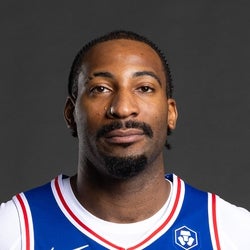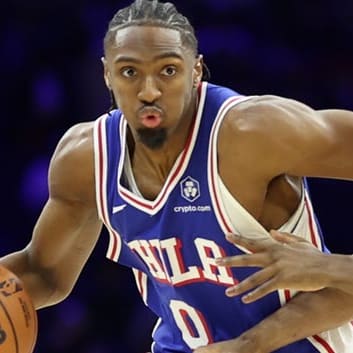2025 Stats
PTS
7.1
REB
9.0
AST
0.8
STL
0.5
BLK
0.9
ROS Projections
2025 Fantasy Outlook
With Joel Embiid sidelined to begin the 2024-25 campaign, Drummond drew nine straight starts, averaging 9.7 points, 10.7 rebounds and 1.6 steals in 26 minutes per game. However, it was all downhill for the veteran from there, outside of a 25-point, 18-rebound outing against Portland on March 3. Drummond struggled to stay healthy himself, and the 76ers were a mess, tanking his fantasy value. He shot 50 percent from the field, the second-lowest mark in his 13-year career. Embiid's injury concerns persist, but Drummond will face stiff competition from Adem Bona for the top backup spot. Bona, a 2024 second-round pick, flashed upside last season, but if the 76ers bounce back, trusting Drummond may be their best win-now move. He gets a slight boost in two-center leagues, but should be your fourth or fifth center in that case. Drummond doesn't need to be taken inside the top-200 picks in standard leagues. Read Past Outlooks

Enters starting lineup
Drummond will start Monday's game versus Charlotte.
ANALYSIS
Drummond will replace Joel Embiid, who is taking the day off for maintenance on the front end of this back-to-back set. As for Tuesday's game against the Bucks, Drummond could be pushed completely out of the rotation once again.
Drummond will replace Joel Embiid, who is taking the day off for maintenance on the front end of this back-to-back set. As for Tuesday's game against the Bucks, Drummond could be pushed completely out of the rotation once again.
NBA Per Game Stats
Per Game
Total
Per 36
NBA Per Game Stats
Loading Per Game Stats...
2025 NBA Game Log
2025
2024
2023
2022
2021
2020
2019
2018
2017
2016
2025 NBA Per Game Split Stats
Schedule
By Month
Starting/Off Bench
Days Rest
Vs Opp
By Result
2025 NBA Per Game Split Stats
Loading Split Stats...
Advanced Stats
Loading Advanced Stats...
Stat Review
2025
2024
2023
2022
2021
2020
2019
2018
2017
2016
How does Andre Drummond compare to other players?
This section compares his stats with all players from the previous three seasons (minimum 200 minutes played)*. The bar represents the player's percentile rank. For example, if the bar is halfway across, then the player falls into the 50th percentile for that stat and it would be considered average.
True Shooting %
56.5%
Effective Field Goal %
54.1%
3-Point Attempt Rate
24.4%
Free Throw Rate
30.1%
Offensive Rebound %
18.5%
Defensive Rebound %
30.8%
Total Rebound %
24.6%
Assist %
5.4%
Steal %
1.1%
Block %
3.9%
Turnover %
10.8%
Usage %
15.0%
Fantasy Points Per Game
22.3
Fantasy Points Per Minute
1.1
NBA Historical Fantasy Stats
Historical ADP
Loading Historical ADP...
76ers Depth Chart
Our full team depth charts are reserved for RotoWire subscribers.
Subscribe Now
76ers Rotation: Minutes Breakdown
Loading 76ers Rotation Data...
Average Fantasy Points
Minutes
FanDuel
DraftKings
Yahoo
FantasyDraft
Head2Head
Sorare
Average Fantasy Points are determined when Andre Drummond was active vs. non-active during the season. Click here to view average fantasy points for a different time period.
Loading Average Minutes...
Past Fantasy Outlooks
2024
2023
2022
2021
2020
2019
2018
2017
2016
2015
2014
2013
2012
Drummond will return to Philadelphia after a two-year stint with the Bulls. He ended the most recent season just outside the top 200 in standard formats, averaging 8.4 points, 9.0 rebounds and 1.5 combined steals and blocks in 17.1 minutes per game. Although he will be a backup center again, there is a decent chance his playing time will increase. Given Joel Embiid's injury history, we have a situation where Drummond's role could improve, and he may actually start a meaningful portion of the season. While this is all speculation, Drummond has proven he can put up standard league value whenever he is given the opportunity. In the final rounds of drafts, Drummond makes sense, assuming you can absorb his fantasy flaws and don't need to start him consistently.
More Fantasy News

Headed to bench
Drummond will come off the bench in Thursday's game versus the Rockets.
ANALYSIS
Subscribe now to instantly reveal our take on this news.
Subscribe now to instantly reveal our take on this news.

Starting sans Embiid
Drummond is in the starting lineup for Tuesday's game against the Suns, per Ky Carlin of USA Today.
ANALYSIS
Subscribe now to instantly reveal our take on this news.
Subscribe now to instantly reveal our take on this news.

Grabs nine boards in garbage time
Drummond ended Wednesday's 133-107 loss to Cleveland with seven points (1-4 FG, 0-2 3Pt, 5-6 FT) and nine rebounds across 12 minutes.
ANALYSIS
Subscribe now to instantly reveal our take on this news.
Subscribe now to instantly reveal our take on this news.

Returning to bench
Drummond isn't in the starting lineup for Monday's game against the Raptors.
ANALYSIS
Subscribe now to instantly reveal our take on this news.
Subscribe now to instantly reveal our take on this news.

Starting Sunday
Drummond is in the starting lineup for Sunday's game in Toronto.
ANALYSIS
Subscribe now to instantly reveal our take on this news.
Subscribe now to instantly reveal our take on this news.
Latest Fantasy Rumors

Could be dealt
The 76ers are open to moving Drummond, Keith Pompey of The Philadelphia Inquirer reports.
ANALYSIS
Drummond has been used sparingly in recent weeks, as Joel Embiid is rounding into form. Plus, the 76ers seem to have growing confidence in Adem Bona. Drummond has made a positive impact on the floor this season, and he could draw interest from contending teams that are in need of help in the rebounding department.
Drummond has been used sparingly in recent weeks, as Joel Embiid is rounding into form. Plus, the 76ers seem to have growing confidence in Adem Bona. Drummond has made a positive impact on the floor this season, and he could draw interest from contending teams that are in need of help in the rebounding department.







